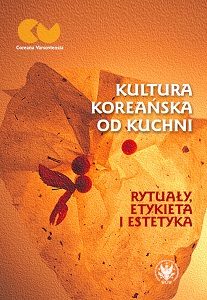Symbolika ryżu w przysłowiach i frazeologizmach koreańskich
The Symbolism of Rice In Korean Proverbs and Idiomatic Expressions
Author(s): Jeong In Choi
Subject(s): Cultural history, Theoretical Linguistics, Applied Linguistics, Philology
Published by: Wydawnictwa Uniwersytetu Warszawskiego
Keywords: rice; rice porridge; rice cake; food; proverb; Korean lexis; Korean phraseology; Korean language
Summary/Abstract: Rice has been a staple food for Koreans for thousands of years. It symbolises life, fertility, and wealth. Its important role in everyday life manifests itself in Korean language in the form of numerous proverbs and idiomatic expressions. The article analyses a set of nouns referring to ‘rice’ in all its forms. Specific expressions are used according to whom rice is served to, the fact if itis served plain or mixed with other grains, and the degree to which it is cooked to. In addition to native Korean nouns, the article also lists Sino-Korean expressions which include ideograms for rice as a grain, and rice as a meal. The examination of various proverbs and idiomatic expressions follows. Each conveys advice or a warning derived from hundreds of years of folk wisdom. Due to rough climate of Korean Peninsula with its harsh winters, eating well was important to be healthy. The article presents expressions praising rice as a way to ward off illnesses. It then moves on to proverbs related to the role of rice in Korean dining etiquette and food culture. Finally, the article takes a closer look at expressions sorted by the ‘purity’ of rice and serving temperature. Plain, white rice was eaten daily only by wealthy people, and as such symbolised good fortune. Its opposite was rice mixed with different grains, such as barley or beans. The other pair of opposites was rice served hot – symbolising energy and luck – and one that got cold – misfortune. Even aft er so much time rice still holds a special place among all other foods in Korea. Itis ever-present on dining tables and represents all that is good in life.
Book: Kultura koreańska od kuchni. Rytuały, etykieta i estetyka
- Page Range: 177-195
- Page Count: 19
- Publication Year: 2021
- Language: Polish
- Content File-PDF

